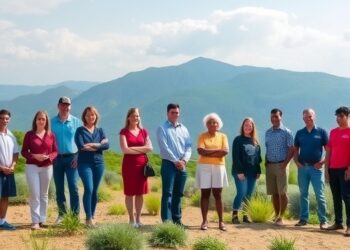In the U.S., as farmers wrestle with extreme heat and drought, heavy rainfall and flooding, and erosion—all factors of climate change which can take a toll on crops—there’s been a lot of buzz over regenerative agriculture over the past few years, as big agriculture companies promise opportunities to make money from “carbon farming” while also improving soil health.
In the U.S., as farmers wrestle with extreme heat and drought, heavy rainfall and flooding, and erosion—all factors of climate change which can take a toll on crops—there’s been a lot of buzz over regenerative agriculture over the past few years, as big agriculture companies promise opportunities to make money from “carbon farming” while also improving soil health.
Regenerative farming strives to improve soil health through various methods, including reduced or no tillage, keeping the soil covered year-round through the use of cover crops, integrating livestock into crop farming, and rotating crops to encourage both above and below ground biodiversity.
Such practices can also be used to create carbon credits for carbon offset programs, which enable polluters to mitigate their greenhouse gas emissions through the purchase of credits.
Farmers have often been told all they need to do is adopt certain practices, such as no-till or cover cropping. But few adopting these practices have signed up for carbon market programs.
While farmer surveys suggest that carbon prices are still too low relative to the paperwork these programs demand, a new study published in Agriculture and Human Values finds that money alone does not explain either farmers’ doubts about carbon markets or their interest in regenerative agriculture. Instead, many farmers view improving soil health as a way to improve their quality of life by reducing their dependence on agrochemical companies’ products and advice.
“Farmers are really looking to get off that treadmill of high-input, high yield commodity agriculture,” says the study’s co-lead author Susanne Freidberg, a professor of geography at Dartmouth.
The study is based on interviews conducted with more than 80 farmers in Kansas and Nebraska in 2022-23. Most were growing commodity crops and/or raising livestock on farms that were a few hundred to a few thousand acres in size. Farmers’ experience using regenerative practices ranged from recent adopters to more than 20 years while others were still considering such methods.
Recent adopters reported high input costs, concerns about soil erosion, and other farmers’ success stories as some of the reasons why they first sought to learn more about soil health, often by attending a field day or conference. But with new practices came new mindsets and new relationships. “Farmers who had implemented regenerative practices talked a lot about how they paid attention to interactions between the different kinds of life in their fields—cover crops, earthworms, and especially soil microbes,” said Freidberg.
Below-ground microbial activity not only builds soil fertility, which enables farmers to use less fertilizer, but also helps reduce erosion, conserve water, and sequester carbon. But field practices that are good for soil microbes are not always good for relations with neighbors and landlords.
“Farmers mentioned that when they stopped tilling and started planting multi-species cover crops, they started getting strange looks at their local coffee shop because now their fields looked messy,” said Freidberg.
These tensions made regenerative farmers’ relationships with each other all the more important with some indicating that they joined informal “support groups” to share experiences or farm equipment. “Farmers who viewed regenerative agriculture as a way to gain more personal freedom also saw that this freedom depended on the support of other farmers,” said Freidberg.
Some farmers also mentioned how they liked seeing birds and other wildlife returning to their fields, and how farming regeneratively had made their day-to-day work more enjoyable and interesting.
The handful of farmers in the study who had signed up for carbon programs emphasized that they looked for programs that did not demand long-term commitments or major changes in their farming practices. One farmer described it as a way to earn “beer money.”
The opportunities for farmers to earn extra income from carbon farming multiplied with the rollout of USDA-funded “climate smart” commodities projects in 2023, around the time the Dartmouth study concluded. Many of these projects, some of the largest of which are run by large food and agribusiness companies, now offer farmers financial incentives to adopt regenerative practices.
But whether many farmers enroll in them, said Freidberg, will depend at least partly on how well the projects take account of what farmers value about such practices. “When farmers talk about the return on investment on regenerative agriculture, they’re talking about more than just money,” said Freidberg.
Julie Snorek, a postdoctoral fellow in geography at Dartmouth at the time of the study and an AAAS Science and Technology Policy Fellow, served as the co-lead author and Geneva Smith, a postdoctoral fellow in the Program on Ecology, Evolution, Environment and Society at Dartmouth, also contributed to the research.
Freidberg is available for comment at: susanne.e.freidberg@dartmouth.edu.
###
Journal
Agriculture and Human Values
Method of Research
Survey
Article Title
Relationships of regeneration in Great Plains commodity agriculture
Article Publication Date
11-Apr-2024




